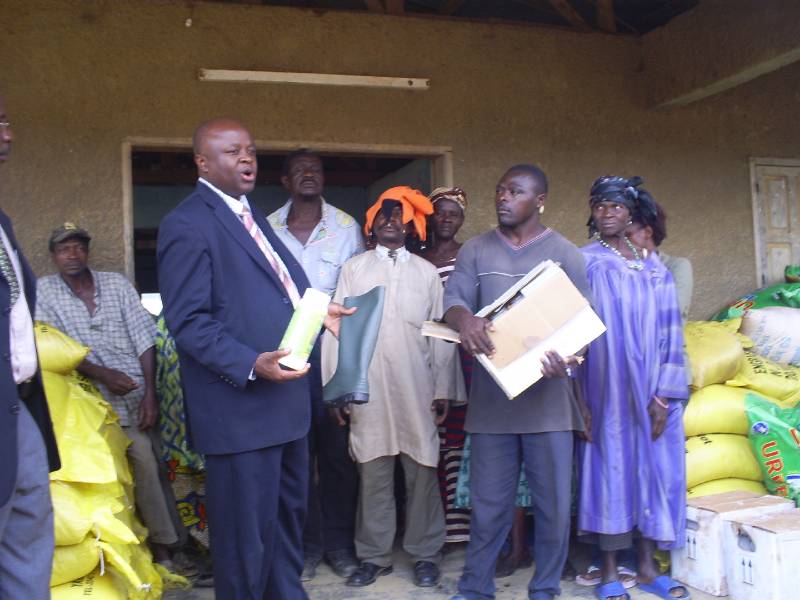What is PADER ?
 The development of primary sector activities can be used as a powerful lever to reduce unemployment in the rural area, and even in the entire country. The rural area, which is home to more than half of our population, appears to be an enormous source of employment, as well as an important area to fight poverty.
The development of primary sector activities can be used as a powerful lever to reduce unemployment in the rural area, and even in the entire country. The rural area, which is home to more than half of our population, appears to be an enormous source of employment, as well as an important area to fight poverty.
In view of these considerations, the NEF, as part of its mission to promote employment, has designed and developed the PADER (Support Programme for Development of Rural Employment).
This programme consists of providing recipients with training in modern exploitation methods, material and financial resources, as well as support for the management and sale of products.
Objectives of PADER
 The objective of the PADER is the promotion of employment and the fight against poverty in rural areas, by the building of the capacities of population in various production fields.
The objective of the PADER is the promotion of employment and the fight against poverty in rural areas, by the building of the capacities of population in various production fields.
More specifically, PADER, through training, financing, monitoring and supervision of rural populations in various production activities, allows:
- The development of the technical know-how of rural populations for a better return on their production activities;
- The Increase in income (as a response to poverty reduction) in rural areas;
- To reduce rural exodus and urban unemployment by making living conditions in rural areas attractive;
- Contribution to growth in general through the development of activities in rural areas;
- To encourage the grouping of producers into CIG. , GIEs or any other form of association, with a view to stimulating all the socio-economic actions, such as the creation of mutual funds, necessary for the development of their activities; and to take advantage of the opportunities offered by other support structures.
PADER strategy and mechanism
Based on a participatory approach of the populations and the support structures, the "PADER" is an interactive training-financing programme for self-employment. Its implementation involves the following five stages:
Step 1: Information and awareness campaign
Step 2: Identification and selection of candidates
During this stage, interested candidates are welcomed, registered and then subjected to an assessment interview. Candidates are selected on the basis of specific criteria: motivation, possession of suitable land, physical capacity (especially for agricultural programmes). NEF is also assisted in this stage by partner structures and by the Ministries in charge of agriculture, livestock and handicrafts.
Step 3: Training
The selected candidates are trained in modern production techniques in their field of activity. The training includes an important follow-up and supervision component in the field. It is provided by approved partners with whom the NEF signs a contract for this purpose. These are management structures specialised in technical support for activities in rural areas.
Candidates first receive a very short theoretical training (about five days) on the techniques of cultivation, conservation and marketing of the products to be sold. This training will continue on the job through monitoring and supervision, after the candidates have become self-employed.
Step 4: Financing and setting up in self-employment
Candidates selected after the training on the basis of a viable project will be financed and set up in self-employment according to NEF procedures.
The financing is granted in the form of material means, inputs, and possibly a support to the Working Capital Fund to reinforce the necessary workforce for the first works.
Each recipient shall make an industrial contribution, which consists of his or her own workforce (for example: the preparation of the soil for sowing in the case of agricultural activities; or the construction of an appropriate shed in the case of a livestock activity).
The recipients should belong to groups organised in such a way that certain production equipment is owned by the group, in order to reduce investment costs. This grouping also facilitates monitoring and generates synergies, which are an important factor for the success and development of the programme.
Step 5: Monitoring and recovery
As noted in step 3, on-the-job training will continue through monitoring and supervision. This component is part of on-the-job training. Both personalised and collective, it covers all the different practical phases from production to marketing. This is fundamental in the conduct of a "PADER". It not only enhances the chances of success of the programme, but also ensures a good recovery rate.
Recovery begins after the first sales of the first production season. It is ensured by both the NEF and the management structure, which has a high level of responsibility due to its involvement in this operation.
Target population
The "PADER" is aimed at all persons residing or likely to reside in rural areas, in order to carry out productive activities.
Implementation report of the PADER / HIPC programme
1. As a reminder
In November 2002, the NEF obtained a financing agreement from the HIPC funds to the tune of 320.962.520 CFA francs to train and install 1.475 people in self-employment in various agricultural fields and in various regions of the country. The implementation of this programme has been delayed by a number of problems, notably the cost of training.
Thus, it was only at the beginning of this financial year that an amount of 190.000.000 F CFA was actually transferred to our accounts. These funds were essentially intended to finance self-employment, as the CCS/HIPC could no longer finance training activities (according to the new procedures). Faced with this situation, and anxious to use these funds to promote employment and combat poverty, the NEF took it upon itself to finance the training component entirely.
2. Objective of the programme
2.1 Operational objectives
To train and install in self-employment 1100 people in the following areas and regions
| Rice | 350 people in Maga, Ndop and Bandounga |
| Maize | 300 people in Nsimalen, South West and Mbam |
| Dry beans | 250 people in Nanga-Eboko, Nkonbon/Nkienegang and Mungo. |
| Garlic | 200 people in Mokon/Koza and Bakong/Bangoulap |
Total: 1.100 people installed (with the exception of the 100 garlic promoters in the Far North, whose installation is in progress, in accordance with the agricultural calendar).
From the progress of the programmes at this stage, we can see that the recipients are very enthusiastic, with a high demand that far exceeds our forecasts. In some regions, as shown on the attached list of the recipient promoters, the groups concerned have joined forces to increase the number of beneficiaries by reducing the amount provided per individual. Thus, in total, 1.174 people benefited from the programme, compared to 1.100 planned.
2.2 The budget of the PADER / HIPC in 2008 is therefore as follows
| HIPC funding | 190.000.000 FCFA |
| FNE financing | 113.304.000 FCFA |
| Promoters' contribution (in workforce) | 129.500.000 FCFA |
| TOTAL IN FCFA | 432.804.000 FCFA |
PADER results as of September 31, 2010
| PADER results at September 31, 2010 | |
| Nomber of programmes | 255 |
| Number of applicants financed | 36 341 |
| Men | 18 787 17 554 |
| Total cost of programmes (in F CFA) | 4 960 836 000 |
| Training Setting up self-employment Average cost of training per person Average cost of funding per person | 2 723 903 000 2 236 933 000 74 954 61 554 |
| Cultivated area (ha) | 17 282 |
| Overall production in tonnes (all products combined) | 238 847 |
| Income generated (in F CFA) | 30 411 783 321 |
| Number of jobs created | 54 512 |
A video of the PADER


